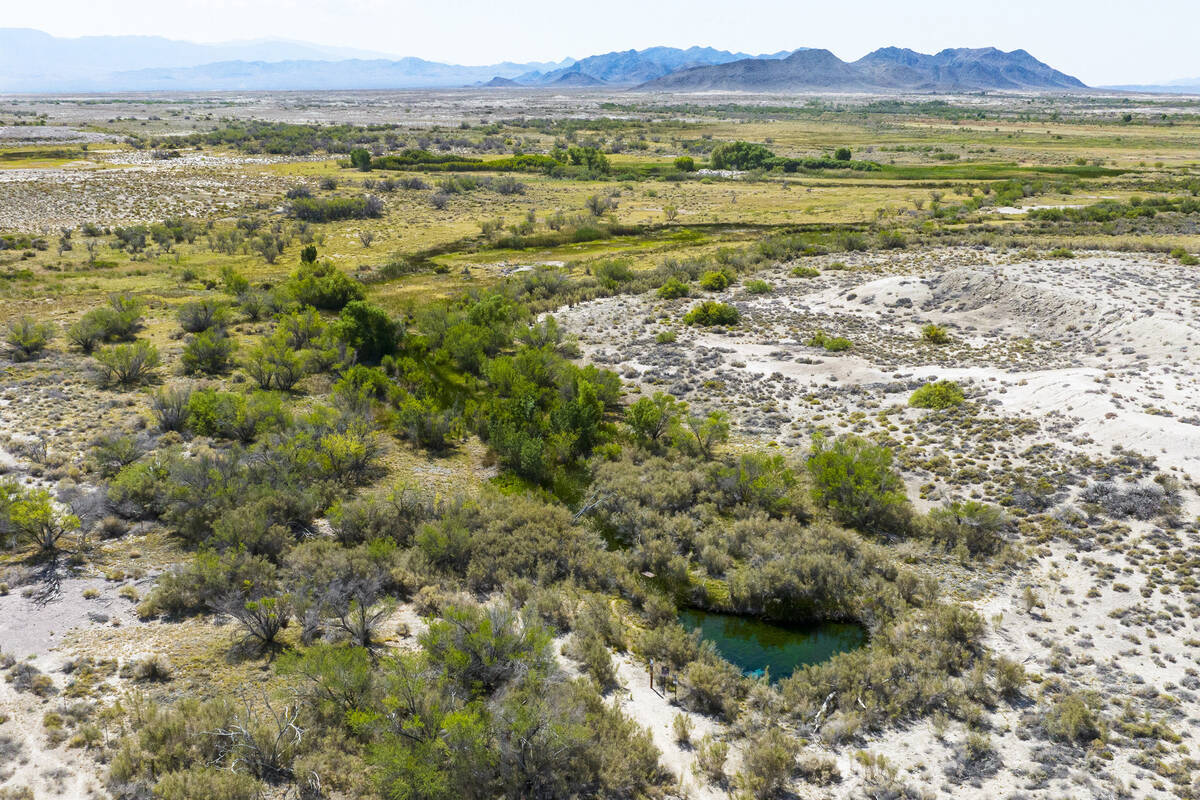Lithium drilling plans near Ash Meadows refuge on pause

The Bureau of Land Management is putting a halt to potential lithium drilling outside Ash Meadows, a decision that comes after intense pushback from environmentalists and residents who voiced concerns about potentially devastating impacts to the fragile oasis.
Rover Metals will now be required to submit a full plan of development to the federal agency as part of an environmental review of the company’s proposed exploratory lithium drilling project on a mining claim just north of Ash Meadows National Wildlife Refuge in Nye County, located roughly 90 miles northwest of Las Vegas.
“Nothing is going to happen until we do a complete (National Environmental Protection Act) review,” BLM Nevada state office spokesperson Rita Henderson said Thursday. “Exploratory drilling is on hold until Rover submits a plan of development.”
BLM officials told representatives from Rover Metals, a Canadian minerals exploration company, of the requirements in a meeting Wednesday.
Previously, the agency said there were no automatic triggers for the environmental review because the Rover Metals project would have disturbed less than 5 total acres of land.
Once the BLM has determined that the company’s plan is complete, then it will tell Rover what information is required, such as resource surveys, to move forward with the environmental review.
The BLM said it will complete any necessary consultation requirements with Native American tribal governments. An environmental review for Rover Metal’s proposal also will include opportunities for the public to comment on the project.
Balancing exploration, protection
After the review is complete, the BLM will determine whether the project will move forward.
“BLM is committed to ensuring any proposed plans for development are done in accordance with law and policy,” a BLM official said in a statement. “We will continue to balance responsible development of critical mineral exploration with protecting the lands, water, and wildlife here in Nevada.”
Rover Metals CEO Judson Culter did not immediately respond to an email seeking comment Thursday.
The company has said ground samples from the area showed high levels of lithium. The company in January submitted its initial drilling notice to the BLM to drill up to 30 boreholes roughly 300 feet deep in search of deposits of the silvery-white metal in the underground clay just north of the refuge.
But some of Rover Metals’ proposed drill holes are within 2,000 feet of the refuge’s northernmost springs.
The Amargosa Conservancy and Center for Biological Diversity sued the BLM and the Interior Department last week over concerns that the drilling could inadvertently drain water away from the federally protected springs and devastate the multiple endemic species that rely on the springs’ waters.
‘We’ll be watching’
The lawsuit accused the BLM of failing to follow requirements under the Endangered Species Act and National Environmental Protection Act that the groups argued should have triggered mandatory environmental reviews because of the potential impact to multiple endangered and threatened species inside the refuge.
“If this news is true, it’s a remarkable victory for our community here in the Amargosa Basin,” Mason Voehl, executive director of the Amargosa Conservancy, said in a statement. “The message from our members and neighbors was loud and clear. Mining that impacts such a sensitive ecosystem doesn’t belong near our beloved Ash Meadows National Wildlife Refuge.”
Lithium, a key mineral used in the production of electric vehicle batteries, is becoming increasingly more valuable as the Biden administration pushes vehicle manufacturers to ramp up electric vehicle production as part of the president’s “clean energy” agenda.
Ash Meadows, established as a wildlife refuge in 1984, is home to four endangered fish species and eight threatened plant species. They include the Devils Hole pupfish, which lives in a single pond on the refuge and is considered the world’s rarest fish.
Patrick Donnelly, Great Basin director at the Center for Biological Diversity, said that requiring an environmental review “is doing the right thing.”
“We hope Rover Metals doesn’t continue pursuing a project that’s clearly inappropriate and destructive,” he said in a statement. “We’ll be watching, and we won’t ever give up our fight to save Ash Meadows.”
Contact Colton Lochhead at clochhead@reviewjournal.com. Follow @ColtonLochhead on Twitter.